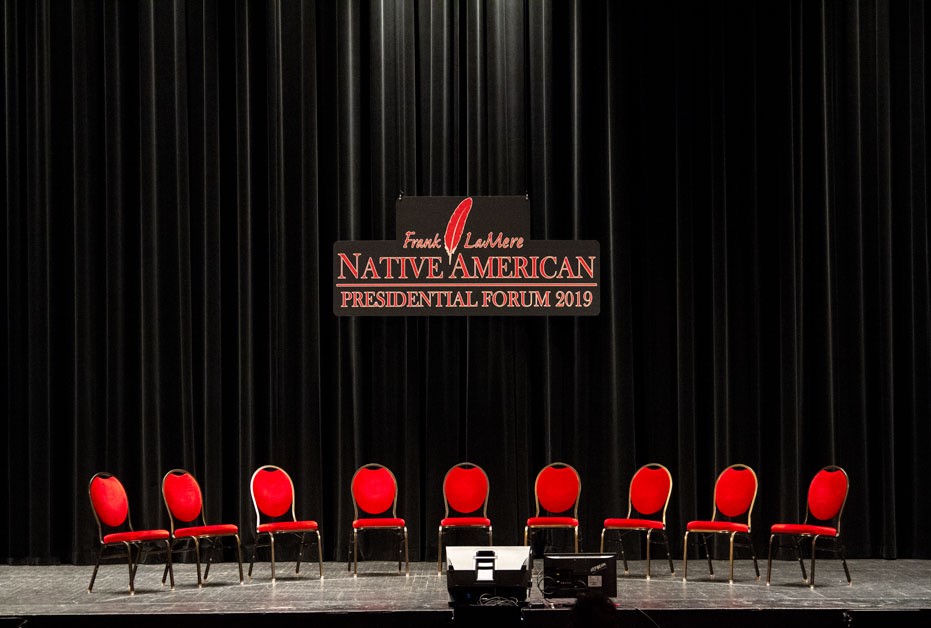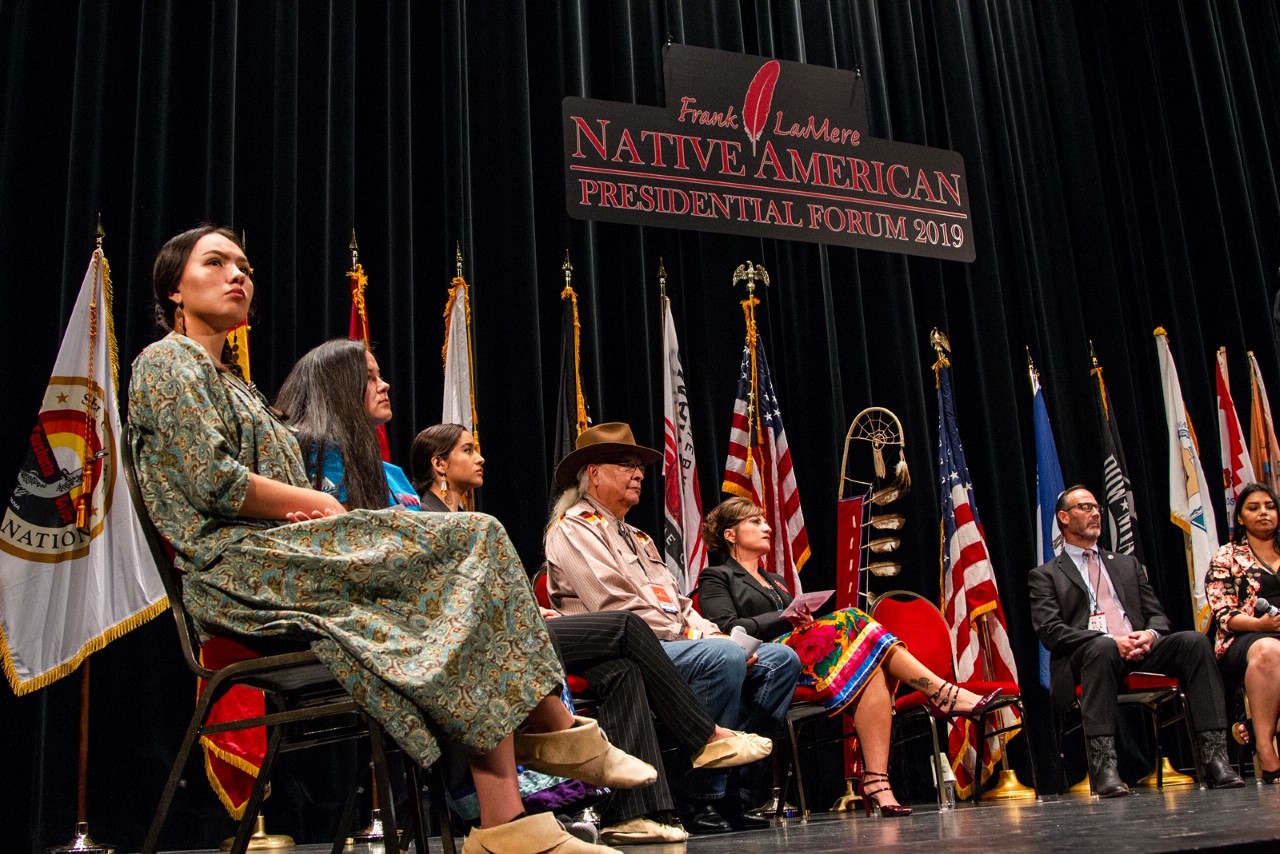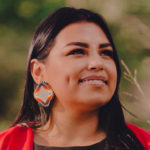Native Youth: 5 Reasons Your Vote Matters in 2020
Here are just five issues of importance in the lives of Native youth. It is up to us to continue the momentum from 2018 midterm elections and vote.
In many ways, the political stakes are always highest for young people—we are the ones that will have to live with the decisions that are made, and their consequences, the longest. Today’s Native youth know this fact well; but we have been kept to the margins of American political participation, just as our families and ancestors have been for as long as there’s been an American politics in which to participate.
I’m here to say: I see you, and I hear you. I am you. I am a twenty-three-year-old Muscogee (Creek) woman, and there is so much change I want to see. We have so many reasons to be cynical. But just as we have always found our way to hope, we also have options. There are things we can do. And just like hope, those things are more powerful than they might seem.
We have so many reasons to be cynical. But just as we have always found our way to hope, we also have options. There are things we can do. And just like hope, those things are more powerful than they might seem.
In my work as a policy entrepreneur, a core part of my mission will be to connect Native youth—to connect us—to our points of leverage over how our country is run, just as much as it will be about working to expand our choices and opportunities even further. One of the points of leverage we already have is among the most broadly available, but is too often discounted: voting. Whatever you believe, and however your beliefs guide you at the polls, we need to get our votes out there. In what follows, I’ll take a look at some of the key issues facing us today that can be impacted by your vote.
Obstacles and Opportunities
One illustration of the meaning our votes have is the fact that mainstream politics is starting to court them, and in ways it never has before. I’m thinking in particular of the Frank Lamere Presidential Forum, which took place this past August in Sioux City, Iowa. Hosted by Four Directions and Native Organizers Alliance, the former dedicated to protecting and expanding Natives’ voting rights and the latter to supporting collaboration among Native leaders and communities, the forum was created to perform a dual task: commemorate one of our most tenacious advocates and create an opportunity for 2020 hopefuls to make their cases directly to Indian Country.

It was the first event of its kind in U.S. history. Under nonpartisan participation rules (while only Democratic and independent candidates attended, Republicans, including President Trump and former governor William Weld, were also invited), candidates for the most powerful office in the United States listened to, and made promises to, their indigenous constituents, and on those constituents’ own turf. I was honored to be invited as one of the tribal youth to the event, to hear the candidates propose policies and make pledges to Indian Country. I also had the opportunity to sit on the panel for Mark Charles, a tribal citizen of the Navajo Nation running for president as an independent candidate.
I am appreciative that this forum occurred, and appreciative that presidential candidates are finally speaking to issues important to, and putting out platforms focused on, the priorities of indigenous people. But our people have received many promises in the past, and experience has not taught us to trust them too easily. Pragmatism seems to say: well, we’ll have to see about that. However, campaigning politicians are pragmatists as well. They came to Sioux City because they need our votes, and they know it. And if we help elect them, they’ll need us in order to stay elected.
There’s real power in our votes. In the 2018 midterm elections, we saw an increase in turnout among Native voters, which resulted in the election of the first Native American women representatives, Congresswoman Deb Haaland (New Mexico) and Congresswoman Sharice Davids (Kansas). I am concerned, though, that tribal communities are not voting at the rates we need for 2020 elections—and therefore are not fully using our power and our voice. Approximately 1.2 million American Indian and Alaskan Native (AI/AN) people over the age of 18 are not registered to vote. The turnout rate for AI and AN people also falls close to 10 percentage points lower than it does for any other racial and ethnic group. This could have a real impact in states like Alaska, New Mexico, Montana, Arizona, and North Dakota, which have the largest number of Native Americans eligible to vote. As for many marginalized communities, voter suppression has been on the rise for tribal citizens—and especially for those living in rural and reservation communities. For instance, just this last August in North Dakota, the Eighth Circuit Court of Appeals upheld a law that requires voters to show an ID that lists a residential postal address. While it may sound minimal, this is actually a huge barrier for Tribal members in North Dakota, because the U. S. Postal Service does not provide residential delivery in rural tribal communities, so community members use P.O. boxes to receive mail. As a result, 2,305 eligible Native voters have lost their constitutional right to have their voices heard. There are other forms of voter suppression in use that rely on strategic policy to discourage Tribal members from voting. There are several Native organizations working to fight against these policies, including Four Directions and Native American Rights Fund. But we need to fight back. Let’s continue to show up at the polls as we did in 2018.

Here are five issues on which voting can make a real difference—issues that touch all of our lives, and all of which need to be acted on by our elected representatives.
1. Tribal Sovereignty
Voting is a right we all have as American citizens; but using it can benefit us and our own nations, too. Few issues straddle the line of our dual citizenship as prominently as sovereignty—the ability for tribes to run their own affairs. It’s a crucial issue that is starting to percolate into the national conversation: during this summer’s presidential forum, every candidate who attended used the word “sovereignty” in discussing their solutions to many of the problems facing tribal communities. Sovereignty is, of course, critical, and we need the federal government to more fully support, fund, and work with tribes to make it happen. But with 573 federally recognized tribes, it’s not that simple. Sovereignty means something so different to each American Indian and Alaskan Native community, and there is no “one size fits all” definition or policy.
Restoring sovereignty is a critical but complicated issue. What it should look like varies across tribes and issue areas. It won’t be solved in one election, or with one piece of legislation. We must restore the powers of tribal courts—and also provide resources to allow those courts to be effective. We should empower tribes to make more educational decisions for their children—and support them in strengthening their schools. We should support smaller tribes who lack the infrastructure to fully embrace sovereignty. We need the federal government to work with us on each of these issues, and on so many more. That’s why your vote matters.
2. The Remove the Stain Act
Some of the wrongs that our people have suffered are never to be fully made right—and the massacre at Wounded Knee is no exception. But how the U.S. government treats the past is the foundation on which the right that is possible can be built, as well as a harmonious and equitable future. One important opportunity for the American state to change its attitude towards the wrongs of the past is represented by the Remove the Stain Act, which was introduced into the House by Representative Denny Heck (D-WA) earlier this year as H.R. 3467. This proposed federal bill would officially rescind twenty medals of honor that were awarded to individuals who participated in that infamous assasination, in which 146 Sioux Natives were murdered.
Some of the wrongs that our people have suffered are never to be fully made right—and the massacre at Wounded Knee is no exception. But how the U.S. government treats the past is the foundation on which the right that is possible can be built.
If passed, this bill’s symbolism would be enormously important: taking this action would mean that the federal government has finally moved from words of apology into real action. It would open the doors for many other bills like this to follow suit in the future. That’s why your vote matters.
3. Missing and Murdered Indigenous Women and Girls (MMIWG)
The disappearance and murder of indigenous women and girls is not a small issue, but a horrendous epidemic, one affecting Native communities on rural, reservation, and urban land. American Indian women are murdered at more than ten times the national average. And the epidemic remains nearly invisible. In a study conducted by the Urban Indian Health Institute, more than 95 percent of the missing or murdered cases in their sample were never picked up by national or international media. Part of the issue is the lack of data to further assess the current impact of the problem—even though we know this is an issue from lived experience. In 2016, 5,712 cases of missing and murdered indigenous women and girls were reported nationally, but only 116 of them were logged in the Department of Justice database—that’s barely 2 percent.
Missing and murdered indigenous women and girls (MMIWG) is a multi-layered crisis. We are only grazing the top by demanding funding to put forth more effort in collecting the data so we have proof that this is an issue in our communities. But it’s a start to demand passage of Savannah’s Act, a federal bill aimed at collecting data on MMIWG cases, as well as to demand passage of an improved Violence Against Women Act (VAWA). That’s why your vote matters. (And if you don’t believe me, check out Representative Deb Haaland in this Center for Native American Youth Instagram video, telling Native youth to use their voices and power to end violence against women and girls by registering to vote!)
In addition, we need to acknowledge this is not just a criminal justice issue—although it certainly is a massive criminal justice issue. It’s also a public health challenge that we need to tackle head-on. This is impacting mothers, aunties, sisters, and daughters across our land, and we need the data immediately. The Urban Indian Health Institute has done a wonderful job of highlighting this. Native women are 2.5 times more likely to be raped or be victims of sexual assault than other women, which is of course a criminal justice issue—but also a massive public health threat for Native women.
4. Educational Opportunity
Education is at the core of keeping tribal communities thriving for generations. Because Native youth are the future of tribal communities, their educational experiences should prepare them for that important task. Unfortunately, Native students also need far more support in school than they are currently getting, or have ever gotten. Our high school graduation rates on average are below 46.6 percent in the seven states with the highest percentages of Native students. And the support they need has to be made available beyond academic performance as well. Today, these students have to contend with overly strict discipline and policing—in Utah, Native students are 7.5 times more likely to be expelled and eight times more likely to be referred to law enforcement than are white students—and invalidating policies like racist mascots, refusals to include Native languages or culturally relevant curricula, and push-backs on wearing traditional clothes at graduation ceremonies, to name just a few examples. It’s no wonder that Native students have a hard time studying when they have to combat colonialism in every direction.
Education is truly fundamental to the growth of Indian Country, and we need our schools to meet our needs. The federal government can increase funding for our schools to the level we need for our students to excel, and can give tribes more autonomy over their students’ curricula and standards that can be tailored to their traditions and culture. That’s why your vote matters.
5. Criminal Justice Reform
At the presidential forum in August, criminal justice reform in Native American communities was not discussed in any meaningful detail—which is true of our national conversations more broadly, too. This needs to change: we need an extensive investment from the federal government in reducing the number of imprisoned indigenous people. Currently, Native girls are more than four times as likely as non-Native girls to be incarcerated; overall, Native Americans are incarcerated at a rate 38 percent higher than that of the national average. And these facts have long-term consequences on things like our educational opportunities. For example, young Native people in juvenile justice facilities experience inadequate access to important classes. Only 63 percent of Native youth in juvenile justice schools have access to Algebra 1, compared with 79 percent of incarcerated white youth. Such courses are necessary for getting one’s GED, and nearly two in five of the Native youth in prison can’t take them.
By voting, we can dismantle the structural racism that lies within our justice system.
Creating awareness around the mass incarceration of indigenous people is important to accelerating the solutions. Recently, a report in Oklahoma showed a decrease in juvenile crimes, but racial disparities remained. Native youth in Oklahoma are 2.5 times more likely to be incarcerated than white youth. By voting, we can dismantle the structural racism that lies within our justice system. We need to elect people who are smart on crime and not just tough on crime. That’s why your vote matters.
The Easiest Way to Affect Change Is to Vote!
There are so many critical issues facing Indian Country, issues that don’t get nearly enough attention on the national stage. Voting alone won’t fix every complex social and policy problem. But it’s the first step to holding elected officials accountable for forward progress on these many complex challenges.
We, as Native youth, must show our strength through unity. If we vote, if we elect government representatives that support our voices as tribal youth, then we can make meaningful progress, through them and with them, on many of the core issues that face us every day. There’s much work to be done; but we can start with voting.
I look forward to seeing you at the polls. Register to vote and consider becoming a Native get-out-the-vote coordinator here.

